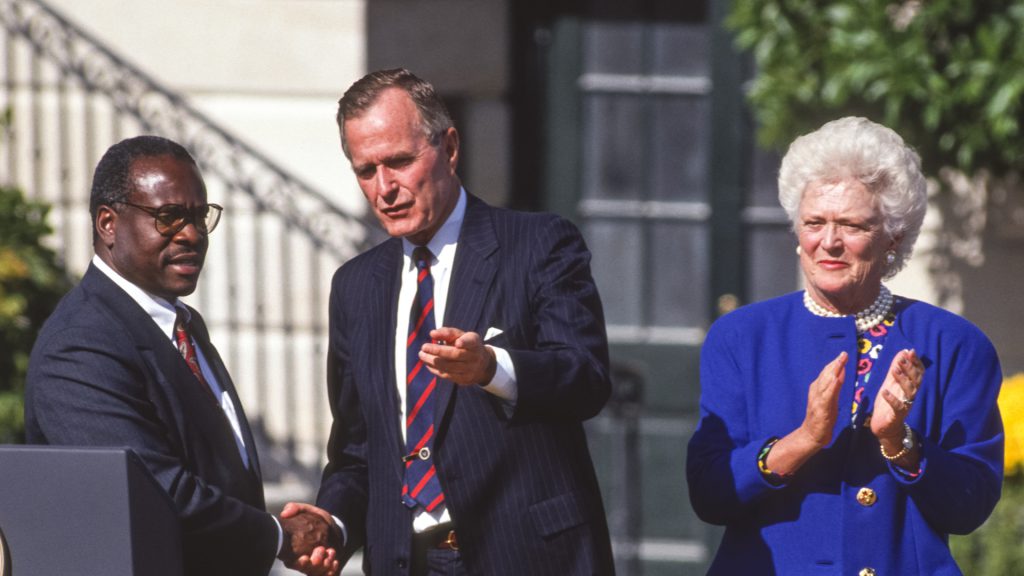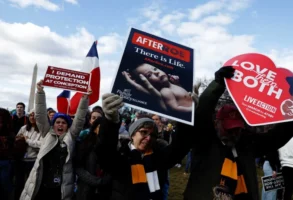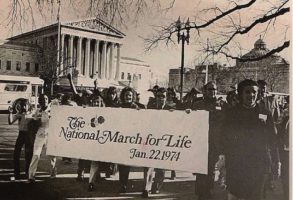
Published May 28, 2020
In another era or a different political climate, Supreme Court justice Clarence Thomas would be one of the most admired and acclaimed figures in American public life. Instead, he mostly flies under the radar, reviled by the Left and often underappreciated by the Right.
A new PBS documentary, Created Equal: Clarence Thomas in His Own Words, probably won’t change that, but it will give anyone who watches it new appreciation for his unbelievable success, a testament to what men are capable of. Thomas is the kind of man who would be hailed as living proof of the American dream were his jurisprudence and political inclinations something other than what they are.
The documentary is both a visual companion to Thomas’s 2007 memoir, My Grandfather’s Son, and a deeper insight into the thinking of a man who worked his way from abject poverty to a seat on the highest court in the country. The two-hour feature tracks his life chronologically, filling in stories from his book with pictures of his inauspicious beginnings in rural Georgia, his school days living with his grandparents in Savannah, his education, and his career.
These photos — and, later, video clips — are interspersed between long interview segments, in which Thomas sits alone at a table facing the camera head-on. The interviewer never appears on screen and only very occasionally interjects to ask a question. With this style, the documentary achieves an open, honest tone, approximating the raw vulnerability on display in My Grandfather’s Son.
Thomas’s unassuming charm comes through most when he makes himself chuckle, or, at times, give a great booming laugh, as a particular memory strikes him. Several of these moments come when he describes his grandfather, who, along with his grandmother, raised Clarence and his younger brother, Myers.
“Boys, the damn vacation is over,” Thomas remembers his grandfather saying when they came to live with their grandparents, after their mother gave up trying to raise them in the squalor of a tiny urban apartment in a city where blacks weren’t even permitted to walk through the center of the public park. His grandparents’ house in Savannah “could’ve been a palace,” he says, recalling that he and Myers flushed the toilet every time they walked by, amazed that it worked. They had never before been in a house with a bathtub.
To hear these stories from the mouth of a man who now sits on the Supreme Court is almost unbelievable, and they add color to what Thomas’s memoir already outlined: a childhood that, at root, created a man who would one day be a justice. These anecdotes help bring Thomas’s character into focus, but the documentary’s chief success is in illuminating how his life — so distinct from that of the typical politician, federal judge, or Supreme Court justice — has informed his judicial philosophy.
The theme at the core of the feature is his resilience, his refusal to believe something or do something simply because some people expect a black man to think or act a certain way. It is clear that his choices were always informed by a lifelong search for deeper meaning, a desire for a fundamental understanding of truth and justice to which he could dedicate himself and his work.
This quest took the form, first, of his time in a Catholic seminary during high-school. During college and law school, he turned to black radicalism, enraged by the injustices he witnessed and experienced. As he matured and learned from his legal work, his thinking departed from left-wing ideology, contradicting what a black man is “supposed” to believe. It led him to do what he once believed was unthinkable and vote for Ronald Reagan in 1980 before going to work in the Reagan administration. Finally, he was shaped by deep study of America’s Founding principles and forged into iron by the injustices he suffered at the hands of those who opposed his Supreme Court confirmation.
The result is the man sitting on the court today, who has a solid, informed view of the Constitution and an unshakable insistence on doing his job as well as he can, guided by and dedicated to what believes is right, regardless of the consequences.
“For what will you die?” Thomas asks rhetorically. “Is there something in life you will die for?” In the natural-law principles undergirding the Declaration of Independence and the U.S. Constitution, Thomas found his answer. Discussing this, his eyes light up, and he becomes more animated than at any other point in the interviews.
“I was always looking for a set of ideals that fundamentally, at its core, said slavery is wrong,” he says. Natural law satisfied that demand, and his steadfast pursuit of originalist jurisprudence is the fruit of his having been convinced that our nation’s Founding philosophy defends human freedom and equality.
His interest in the natural law became a flashpoint when President George H. W. Bush nominated him to become only the second African-American Supreme Court justice in history, replacing the first, Thurgood Marshall. Democratic senators, fearful that Thomas would rule against Roe v. Wade and legal abortion, used his view of natural law as a pretext to oppose him.
The documentary shows footage of the hearing, including Joe Biden — then a senator from Delaware and chairman of the Judiciary Committee — attempting to prod Thomas on the supposedly sinister meaning of his natural-law beliefs. In one of his wriest moments, Thomas says of the experience, “One of the things you do in a hearing is you have to sit there and look attentively at people you know have no idea what they’re talking about.”
He isn’t afraid to be blunt, saying that opponents of his nomination believed he was “the wrong black guy.” Later, discussing the outright racism against him in the press and the treatment he received from Democrats during the Anita Hill hearing, he says, “If you criticize a black person who’s more liberal, you’re racist. But you can do whatever to me, or now to Ben Carson, and that’s fine. We’re not really black, because we’re not doing what they expect black people to do.”
For the viewer, it might bring to mind a recent comment from Biden himself, who told an African-American host in an interview, “If you have a problem figuring out whether you’re for me or Trump, then you ain’t black.” New York Times writer Nikole Hannah-Jones defended Biden obliquely on Twitter, insisting that there’s “a difference between being politically black and racially black.”
The documentary captures Thomas’s thoughts on this sort of identity-politics game, to which liberals have subjected him for decades, in the discussion of his confirmation hearing. “[Democratic senators] refused to believe you had not discussed Roe v. Wade,” the interviewer says.
“Well, you know what, they refused to believe a lot of things, and isn’t that fascinating,” he says.
I have to have discussed [Roe] because they wanted me to have discussed it. It goes back to the thing about affirmative action. You have to believe in affirmative action, because we think you ought to believe in affirmative action. Well how is that different from slavery? How is that different from segregation? How is that different from being told you can’t walk across that park? You know what, I prefer to be excluded from the park, because I can live my life quite freely without setting foot in a park, but you can’t live it freely without having your own thoughts.”
As the documentary closes, Thomas turns back to his grandfather, who died while their relationship was strained, one of the justice’s foremost regrets. “I want to be able to say to him, ‘I lived up to my oath, and I did my best,’” he says. “I want to be able to say that it’s a job well done.”
In brief shots of his office, a few things are immediately visible: a portrait of Frederick Douglass behind his desk, a bust of his grandfather on top of his bookcase, an American flag in the corner, and a crucifix on the wall. It is a neat summation of who he is, what he believes, and why he sits where he does today — a justice not for himself, for the sake of power or to impose his own ideology, but in service of a higher purpose and a greater good.
Alexandra DeSanctis is a staff writer for National Review and a visiting fellow at the Ethics and Public Policy Center.




